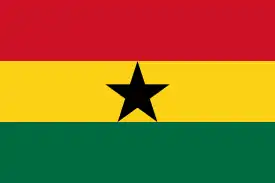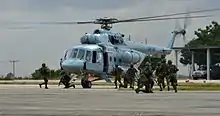Ghana Air Force
The Ghana Air Force (GHF) is the aerial warfare organizational military branch of the Ghanaian Armed Forces (GAF). The GHF, along with the Ghanaian army (GA) and Ghanaian navy (GN), make up the Ghanaian Armed Forces (GAF), which are controlled by the Ghanaian Ministry of Defence (MoD).
| Ghana Air Force | |
|---|---|
 Ghana Armed Forces emblem | |
| Founded | 29 July 1959 |
| Country | |
| Type | Air force |
| Role | Aerial warfare |
| Size | 22 aircraft [1] |
| Part of | Ghana Armed Forces |
| Headquarters | Burma Camp |
| Colours | |
| Engagements | First Liberian Civil War[2][3] Second Ivorian Civil War[4][5][6] Mali War[7][8] |
| Commanders | |
| Chief of the Air Staff | Air Vice Marshal Frederick Asare Bekoe |
| Insignia | |
| Roundel |  |
| Fin flash |  |
| Aircraft flown | |
| Fighter | Embraer EMB 314 Super Tucano |
| Patrol | Diamond DA42 Twin Star |
| Trainer | Hongdu K-8 Karakorum |
| Transport | EADS CASA C-295, Fokker F28 Fellowship |
History
The GHF (Ghana Air Force) started on 24 July 1959 as a Flying Training School with Israeli instructors and technicians, under the command of Lt. Col. Adam Shatkay of the IAF. The School was established as a cradle of a service to complement the Army and the Navy. Later that year a headquarters was established in Accra under the command of Indian Air commodore K. Jaswant-Singh who was appointed as the first Chief of Air Staff (CAS).[9] In 1960 Royal Air Force personnel took up the task of training the newly established Ghana Air Force and in 1961 they were joined by a small group of Royal Canadian Air Force personnel. In September 1961 as part of President Kwame Nkrumah's Africanization program, a Ghanaian CAS was appointed, with the first being J.E.S. de Graft-Hayford, born in the U.K. of Ghanaian descent.
The Ghana Air Force was in the beginning equipped with a squadron of Chipmunk trainers, and squadrons of Beavers, Otters and Caribou transport aircraft. In addition a DH125 jet was bought for Kwame Nkrumah, Hughes helicopters were bought for mosquito spraying plus DH Doves and Herons. British-made Westland Whirlwind helicopters and a squadron of Italian-made MB-326 ground attack/trainer jets were also purchased.
In 1962 the national School of Gliding was set up by Hanna Reitsch, who was once Adolf Hitler's top personal pilot. Under the command of Air Commodore de Graft-Hayford, she served as director, operations instructor and trainer of the school. She also acted as the personal pilot of Kwame Nkrumah from 1962–1966.
Organisation
The GHF headquarters is located at Burma Camp and the main transport airfield is the Air Force Base Accra, which shares the same runway with the Kotoka International Airport. Other GHF airfields include:
- Air Force Base Tamale, which shares its runway with the Tamale Airport.
- GHF Air Force Station Sekondi-Takoradi started as RAF Station Takoradi, then became Ghana Air Force Station Sekondi-Takoradi on 1 March 1961. The Chipmunk Basic Trainer Aircraft was the first aircraft used at the Station with an all Rank Air Force Station.
- GHF Air Force station Accra came into being soon after the Royal Air Force (RAF) had taken over the administration from the Indian and Israeli Air Force officers at the beginning of 1961. The station was housed at No 3 hangar at the Accra Airport (Kotoka International Airport) with hardly any aircraft. The Unit had four main sub-units, i.e. the Administration Wing, Flying Wing, Technical Wing and Equipment Wing. The School of Technical Training was also located at this station. The Station moved from No 3 hangar to its present location in Burma Camp towards the end of 1965.[9]
Mission

The role of the Ghana Air Force, as defined in the National Defence Policy, is to provide "Air Transport and Offensive Air Support to the Ghana Armed Forces and to protect the territorial air space of Ghana". The National Defense Policy states certain specific tasks which the Ghana Air Force is expected to perform:
- To maintain Fighter Ground Attack capability and provide Close Air Support during operation.
- To provide transport support to the Ghana Armed Forces.
- To provide surveillance over the air space of Ghana and over the Exclusive Economic Zone (EEZ).
- To provide liaison and recce flight capability.
- To provide VIP flight capability.
- To provide transport support for civilians as government directs.
- To provide medical evacuation and air rescue assistance.
The Ghana Air Force is also responsible for the co-ordination and direction of Search and Rescue (SAR) within the Accra Flight Information Region.[9]
Aircraft
Active inventory

| Aircraft | Origin | Type | Variant | In service | Notes | |
|---|---|---|---|---|---|---|
| Combat | ||||||
| Embraer EMB 314 | Brazil | light attack / COIN | 5 on order[10] | |||
| Reconnaissance | ||||||
| Diamond DA42 | Austria | surveillance | 2[11] | |||
| Transport | ||||||
| CASA C-295 | Spain | utility / transport | 2[11] | |||
| Helicopters | ||||||
| Mil Mi-24 | Russia | attack | Mi-35 | 1 on order[11] | ||
| Mil Mi-17 | Russia | utility / transport | Mi-17/171 | 6[11] | ||
| Bell 412 | United States | utility | 1[11] | |||
| Harbin Z-9 | China | utility | 4[11] | |||
| Trainer Aircraft | ||||||
| Aero L-39NG | Czech Republic | jet trainer | 6 on order[12] | |||
| Hongdu K-8 | China | jet trainer | 4[11] | |||
| Diamond DA42 | Austria | multi engine trainer | 1[11] | |||
Retired
Previous notable aircraft operated were the Aermacchi MB-339, MB-326, DHC-4 Caribou, Fokker F27 Friendship, de Havilland Heron, Short Skyvan, BN-2 Islander, Beagle Husky, DHC-3 Otter, Cessna 172, Bell 212, Westland Wessex, Aérospatiale Alouette III, Mil Mi-2, Scottish Aviation Bulldog, DHC-1 Chipmunk, L-29 Delfín, and the Aero L-39ZO[13][14]
Chiefs of Air Staff
The senior appointment in the GHF is the Chief of Air Staff. The following is a list of the Ghana Air Force Chiefs of Air Staff:[15]
| Chief of Air Staff | Conscription | Note |
|---|---|---|
| Air Commodore K. Jaswant-Singh | May 1959 – August 1960 | Indian |
| Wing Commander I. M. Gundry-White | September 1960 – March 1961 | British |
| Air Commodore John N. H. Whitworth | March 1961 – September 1962 | British |
| Air Commodore J.E.S. de Graft-Hayford | September 1962 – July 1963 | First Ghanaian CAS |
| Air Vice-Marshal Michael Otu | July 1963 – March 1968[16] | |
| Air Commodore N. Y. R. Ashley-Larsen | March 1968 – January 1971 | |
| Air Commodore Charles Beausoliel | January 1971 – December 1971 | |
| Air Commodore N. Y. R. Ashley-Larsen | December 1971 – January 1972 | |
| Air Commodore Charles Beausoliel | December 1972 – November 1976 | |
| Air Vice Marshal George Yaw Boakye | November 1976 – June 1979 | |
| Wing Commander Samuel Gyabaah[17] | June 1979 – July 1979 | |
| Group Captain F. W. K. Klutse | July 1979 – December 1979 | |
| Air Commodore J. E. Odaate- Barnor | December 1979 – May 1980 | |
| Air Commodore K. K. Pumpuni | May 1980 – January 1982 | |
| Group Captain E. A. A. Awuviri | January 1982 – December 1982 | |
| Air Vice Marshal J. E. A. Kotei | December 1982 – June 1988 | |
| Air Marshal Harry Dumashie | June 1988 – June 1992 | |
| Air Marshal John Asamoah Bruce | 5 June 92 – February 2001 (? – 16 March 2001) |
|
| Air Vice Marshal Edward Apau Mantey | February 2001 – January 2005[18] | |
| Air Vice Marshal Julius Otchere Boateng | 20 May 2005 – to 28 January 2009[19] | |
| Air Vice Marshal M. Samson-Oje | 31 March 2009 – January 2016[20] | |
| Air Vice Marshal Maxwell Mantsebi-Tei Nagai | January 2016 – January 2019 [20] | |
| Air Vice Marshal Frank Hanson | January 2019 – January 2023 [20] | |
| Air Vice Marshal Frederick Asare Bekoe | January 2023 – present |
Rank structure
The GHF's rank structure is similar to the RAF's rank structure from where its ranks were derived.
- Commissioned officers
| Rank group | General / flag officers | Senior officers | Junior officers | Officer cadet | ||||||||||||||||||||||||||||||||
|---|---|---|---|---|---|---|---|---|---|---|---|---|---|---|---|---|---|---|---|---|---|---|---|---|---|---|---|---|---|---|---|---|---|---|---|---|
 |
 |
 |
 |
 |
 |
 |
 |
 |
 |
|||||||||||||||||||||||||||
| Air Chief Marshal | Air Marshal | Air Vice-Marshal | Air Commodore | Group Captain | Wing Commander | Squadron Leader | Flight Lieutenant | Flying Officer | Pilot Officer | |||||||||||||||||||||||||||
- Enlisted
| Rank group | Senior NCOs | Junior NCOs | Enlisted | |||||||||||||||||||||||||||||||||
|---|---|---|---|---|---|---|---|---|---|---|---|---|---|---|---|---|---|---|---|---|---|---|---|---|---|---|---|---|---|---|---|---|---|---|---|---|
 |
No insignia | |||||||||||||||||||||||||||||||||||
| Warrant Officer Class I | Warrant Officer Class II | Flight Sergeant | Sergeant | Corporal | Leading Aircraftsman | Aircraftsman | ||||||||||||||||||||||||||||||
References
- World Air Forces 2014, Flightglobal Insight, 2014
- Noble, Kenneth B. (17 September 1990). "Ghana Is Said to Strike Liberian Rebels". New York Times.
- "Ghana's aircraft bomb rebel targets in Liberia". Tampa Bay Times. 17 October 2005.
- "Legacy of Ghav's pioneers of peace". African Aerospace. 22 November 2017.
- "Ghana's air force in a class of its own". African Aerospace. 8 May 2019.
- Nossiter, Adam (4 April 2011). "Strikes by U.N. and France Corner Leader of Ivory Coast". New York Times.
- https://www.myjoyonline.com/news/national/crashed-military-aircraft-survived-bomb-attack-in-mali/#!
- "Ghana's small unit making a huge impact". African Aerospace. 10 March 2017.
- Ghana air force. gaf.mil.gh.
- "Embraer Defense & Security sells five A-29 Super Tucano to the Ghana Air Force". prnewswire.com. Retrieved 26 April 2017.
- "World Air Forces 2023". Flightglobal Insight. 2023. Retrieved 7 December 2022.
- "Ghana Air Force to get six L-39NG aircraft". Air Recognition. 21 December 2021. Retrieved 22 December 2021.
- "World Air Forces 2004 pg, 59". Flightglobal I. 2004. Retrieved 4 December 2014.
- "Historical Listings: Ghana, (GHA)." Archived 2011-07-20 at the Wayback Machine World Air Forces. Retrieved: 19 May 2011.
- "Past Chiefs of Air Staff". Official website. Ghana Armed Forces. 6 February 2008. Archived from the original on 21 July 2011. Retrieved 2 November 2008.
- Military Air Vice-Marshal Archived 28 September 2007 at the Wayback Machine. thestatesmanonline.com.
- "Ghana News, Volumes 8". Ghana News. Washington, D.C. : Embassy of Ghana: 3. 1979.
- "Immediate Past Chief of Air Staff – Ghana Air Force". Official website. Ghana Armed Forces. 22 April 2005. Archived from the original on 7 January 2008. Retrieved 11 June 2007.
- "Chief of Air Staff – Ghana Air Force". Official website. Ghana Armed Forces. 21 May 2005. Archived from the original on 27 August 2007. Retrieved 11 June 2007.
- Mahama, makes changes at the military hierarchy. "Mahama makes changes at the military hierarchy". myjoyonline.com. Multimedia Group. Archived from the original on 1 August 2017. Retrieved 5 June 2017.
- World Aircraft Information Files. Brightstar Publishing, London. File 338 Sheet 03
- Veep Commissions CASA -C295 Aircraft Into Armed Forces Service. Ghanaian Times. newtimes.com.gh.
- Defence Equipment & Technology. janes.com.
External links
 Media related to Ghana Air Force at Wikimedia Commons
Media related to Ghana Air Force at Wikimedia Commons